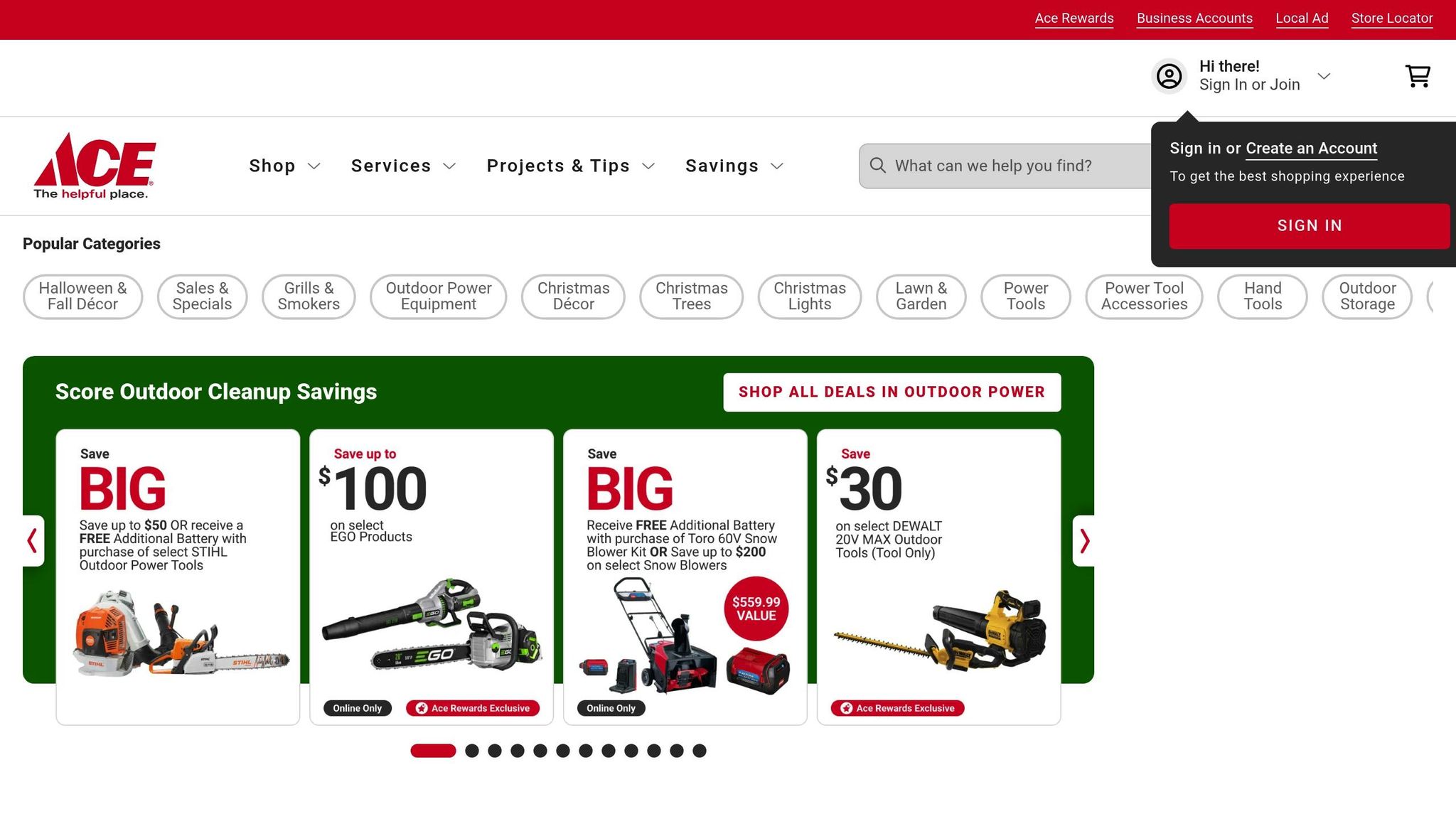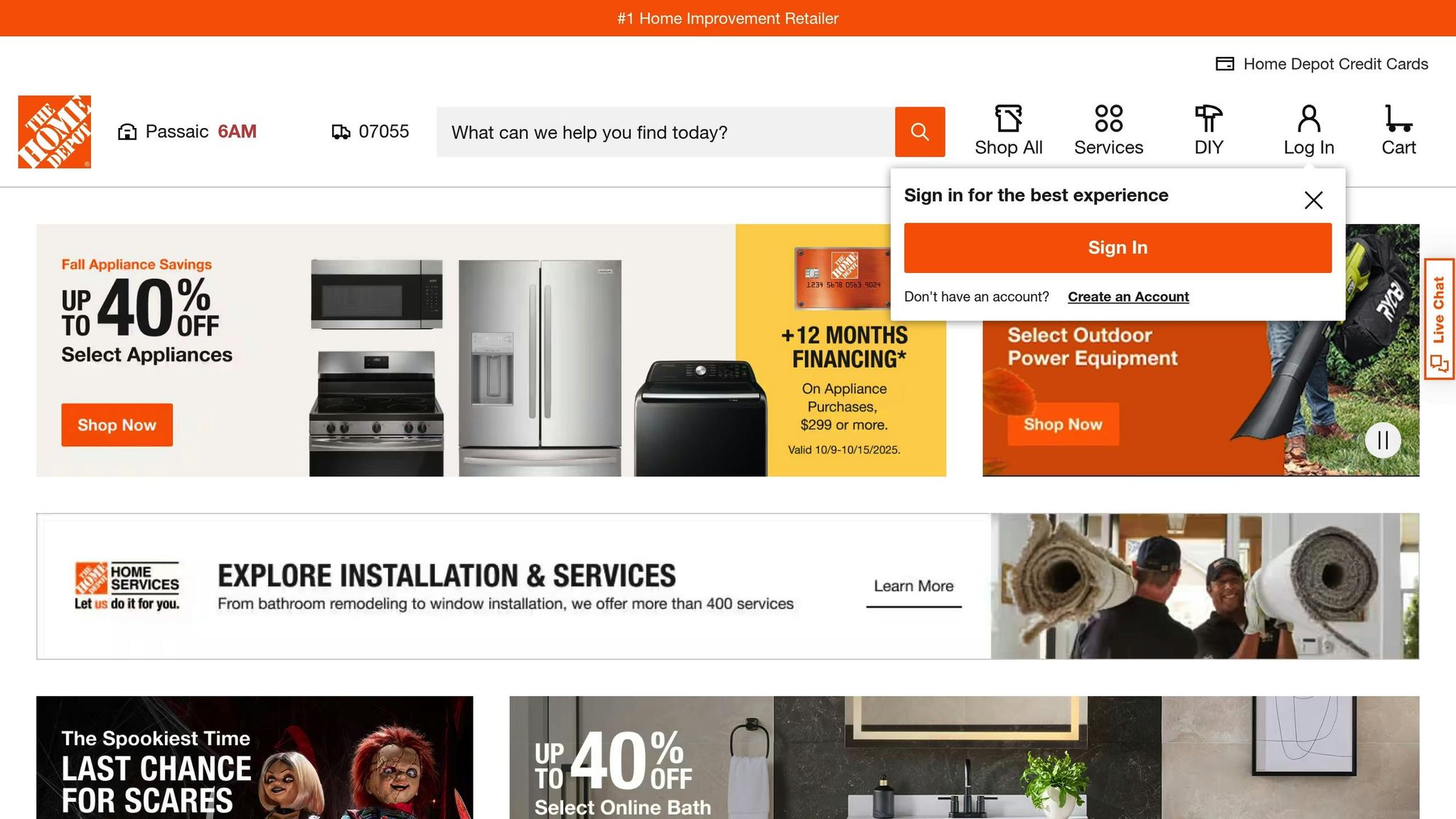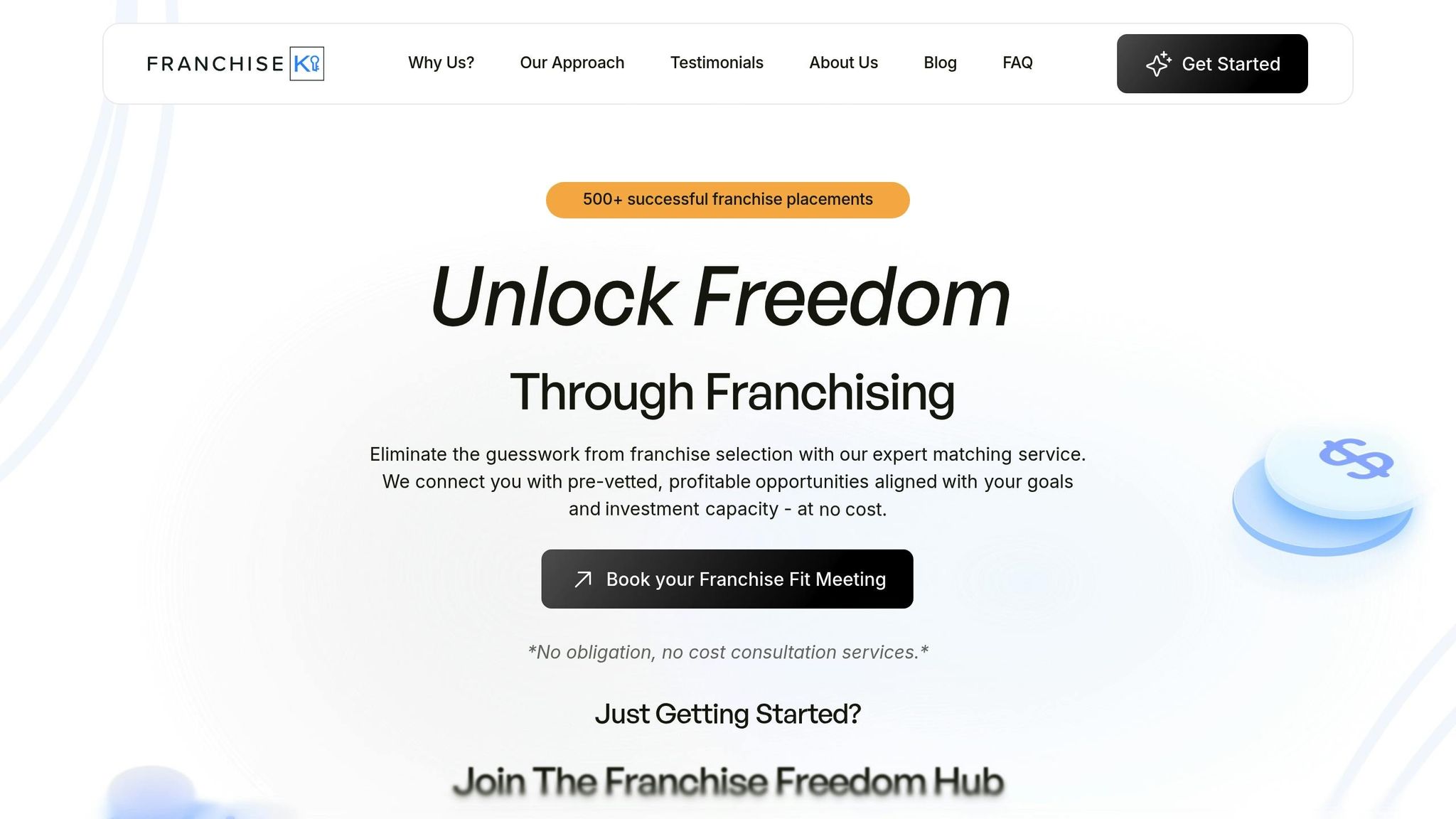Franchise Strategies
Oct 14, 2025
Explore the contrasting business models of two major hardware retailers, highlighting the challenges faced by smaller franchises in a competitive market.
Ace Hardware and Home Depot serve the same audience - DIYers, homeowners, and contractors - but their business models couldn’t be more different. Ace operates as a cooperative franchise, giving local owners flexibility to cater to their communities. Home Depot, on the other hand, dominates with a centralized corporate structure, massive buying power, and operational efficiency.
Here’s the reality: Home Depot’s scale and pricing power make it increasingly difficult for Ace to compete. While Ace focuses on personalized service, its smaller size limits its ability to offer the same variety and low prices. Meanwhile, Home Depot’s extensive inventory, advanced technology, and streamlined operations attract both budget-conscious shoppers and professionals.
Key Takeaways:
Ace Hardware: Small, locally owned stores excel in community connections but struggle with higher costs and limited product range.
Home Depot: Large-scale operations enable lower prices, broader inventory, and consistent service nationwide.
Quick Comparison
Feature/Factor | Ace Hardware | Home Depot |
|---|---|---|
Ownership Model | Franchise cooperative | Corporate chain |
Store Size | Smaller retail spaces | Large-format stores |
Product Range | Limited selection | Extensive variety |
Pricing Strategy | Local flexibility | Low-price leadership |
Target Audience | Local homeowners, small projects | DIYers, contractors |
Customer Service | Personalized, local focus | Efficient, self-service |
Technology Adoption | Basic systems | Advanced supply chain & analytics |
Ace’s localized approach appeals to niche markets, but in a price-driven and convenience-focused world, Home Depot’s advantages are hard to ignore. For franchise investors, the decision often comes down to balancing personal involvement with the challenges of competing against corporate giants.
Which hardware stores has the most cost-effective hardware? 
Ace Hardware: Franchise Model Benefits and Drawbacks

Ace Hardware runs on a cooperative franchise model, where stores are independently owned. This setup brings a mix of advantages and challenges. On one hand, it allows individual stores to cater to their local markets. On the other, it comes with certain constraints tied to its structure. Let’s break down the pros and cons.
Benefits: Tailored to Local Markets
One of the standout advantages of Ace Hardware's model is the ability for local owners to make quick decisions based on their community's needs. This flexibility lets franchisees adjust their strategies to match local preferences, creating a more personalized shopping experience.
Drawbacks: Struggles with Scale
While the model supports local autonomy, it falls short in leveraging economies of scale. Without the bulk buying power of larger chains, franchisees face higher operating costs. This limits their ability to offer competitive pricing, making it harder to compete with big-box retailers that thrive on lower costs and greater efficiency.
Home Depot: Corporate Structure and Market Leadership

Home Depot operates with a centralized corporate structure, which ensures streamlined decision-making and operational consistency. Unlike independent franchise models, this approach enables Home Depot to maintain uniform service standards and consistently offer competitive pricing.
The company's strategy blends differentiation with a strong focus on cost efficiency. By prioritizing cost minimization, Home Depot can deliver attractive pricing to its customers. This strategic foundation highlights how the company's scale translates into concrete advantages for both customers and stakeholders.
Benefits: Large-Scale Operations and Extensive Product Range
With a network of over 2,200 stores across North America, Home Depot harnesses its immense buying power and "Superstore" format to keep costs low. In 2020, the company reported an impressive $132.1 billion in revenue, underscoring the financial strength behind its operations.
Each store spans an average of 105,000 square feet (about 9,755 square meters), creating a one-stop shopping experience stocked with a wide array of products at competitive prices.
"You could trust that the Home Depot would have what you needed at a very competitive price." – Cascade
Home Depot also benefits from exclusive supplier partnerships, which help reduce costs further. The company actively employs market penetration tactics, such as regular discounts and special promotions, to attract a broad customer base.
This scale and efficiency benefit both DIY customers and professional contractors. With a 17% share of the U.S. home improvement market, Home Depot has become a go-to resource for professionals who rely on consistent inventory and pricing across locations.
Efficient Operations and Nationwide Reach
Home Depot's standardized processes are key to its operational success. In 2021, the company employed 504,800 people and implemented efficient systems to manage this large workforce effectively.
The company's advanced inventory systems, refined over decades, allow for seamless purchasing and warehousing operations. These systems, paired with large-scale operations, enable Home Depot to deliver consistent service across its nationwide network.
Data analytics also play a significant role in enhancing efficiency. From inventory management to staffing decisions, Home Depot uses detailed insights to optimize operations in ways that smaller, independent stores cannot replicate.
Strategic acquisitions and a unified national network further enhance Home Depot's purchasing power and operational efficiency. This ensures consistent pricing and service for customers while also strengthening relationships with suppliers. These factors solidify Home Depot's reputation as a trusted choice for both consumers and contractors alike.
Direct Comparison: Why Ace Hardware Falls Behind
Business Model and Customer Service Differences
Ace Hardware operates under a cooperative structure, which stands in stark contrast to Home Depot's centralized corporate model. This setup at Ace means individual franchise owners handle local decision-making within the framework of cooperative rules. While this approach allows for community-specific tailoring, it often results in inconsistent pricing and service across locations.
On the other hand, Home Depot's centralized model gives it a significant edge in purchasing power. By negotiating directly with manufacturers, Home Depot secures lower wholesale prices, allowing it to offer products at more competitive rates. For example, a basic drill is often cheaper at Home Depot, thanks to its ability to leverage economies of scale. These pricing disparities underscore the challenges inherent in Ace's franchise-based approach.
Ace Hardware prioritizes personalized service and fosters strong community relationships, presenting itself as the go-to neighborhood store. In contrast, Home Depot focuses on offering a broad selection of products at competitive prices, catering to both DIY enthusiasts and professional contractors. While Ace's approach resonates with customers seeking tailored assistance, it struggles to compete when price and variety take precedence.
Staffing differences further highlight the divide. Ace Hardware's smaller, locally managed teams contrast with Home Depot's larger, specialized workforce, which is designed to handle high customer volumes efficiently. The table below breaks down these distinctions.
Comparison Table: Key Business Factors
Feature/Factor | Ace Hardware | Home Depot |
|---|---|---|
Ownership Model | Franchise cooperative | Corporate chain |
Store Size | Smaller retail spaces | Large-format stores |
Product Range | Limited selection | Extensive product variety |
Pricing Strategy | Local flexibility and service | Low-price leadership |
Target Audience | Local homeowners, small projects | DIYers and professional contractors |
Customer Service | Personalized, community-focused | Efficient, self-service experience |
Investment Model | Franchise investment required | Corporate-owned (no franchises) |
Market Presence | Niche focus | National reach in home improvement |
Revenue Performance | Lower sales volumes per store | Higher sales volumes per store |
Supplier Relationships | Cooperative buying arrangements | Direct manufacturer partnerships |
Technology Adoption | Basic systems | Advanced supply chain and analytics |
Professional Services | Limited installation offerings | Comprehensive contractor services |
The table paints a clear picture of why Ace Hardware's smaller, localized model struggles to keep pace with Home Depot's expansive corporate strategy. Home Depot's operational efficiencies, national reach, and advanced technology give it a significant upper hand.
Another critical factor is technology. Home Depot has made substantial investments in cutting-edge supply chain systems, inventory management, and customer analytics. These tools streamline operations and improve customer experiences. Meanwhile, many Ace Hardware franchises rely on more basic systems, which can limit their ability to compete effectively. This growing technology gap further solidifies Home Depot's position as a dominant player in the home improvement market.
Franchise Investment and Selection Factors
What Potential Franchise Owners Should Know
When it comes to Ace Hardware, potential franchise owners need to take a close look at the operational challenges that set it apart from larger corporate competitors. Investing in an Ace Hardware franchise means being prepared for a significant financial commitment and understanding the nuances of the market. This includes everything from initial startup costs to ongoing operational expenses. Having a solid financial foundation is just the beginning - franchisees must also be ready to actively manage day-to-day operations, oversee staff, and engage with the local community. This is far from a hands-off investment.
Ace Hardware thrives in communities that value personalized service, but this strength comes with its own challenges. Franchisees must maintain high service standards while navigating stiff competition from larger retailers offering lower prices and broader product ranges. Even in markets where Ace Hardware’s community-focused model fits well, these competitive pressures are a constant reality.
Operational hurdles also play a role. Smaller order volumes can drive up per-unit costs and limit a franchisee’s ability to influence supplier decisions or promotional campaigns. In some cases, additional investments in technology may be necessary to streamline operations and improve efficiency.
How Franchise Ki Helps With Your Decision

In such a competitive landscape, aligning your financial resources, risk tolerance, and goals with the right franchise opportunity is critical. That’s where Franchise Ki steps in. They offer free consulting services designed to guide entrepreneurs through these complex decisions.
Bennett Maxwell, the founder of Dirty Dough Cookies and now CEO of Franchise Ki, brings a wealth of experience to the table. Having successfully sold over 300 franchise units in just two years, Maxwell understands what it takes to thrive in the franchise world. His insights help prospective franchisees grasp the key factors that influence a franchise’s performance, as well as the challenges smaller operators face when going up against major chains.
The consultation process with Franchise Ki starts with a deep dive into your personal circumstances. This tailored approach ensures that the franchises being considered align with your unique goals and situation. This is particularly crucial for franchises like Ace Hardware, where success depends heavily on local market conditions and the owner’s willingness to take a hands-on approach.
Liam Chase, CRO and co-founder of Franchise Ki, has a proven track record of helping clients succeed. For example, one client expanded from 13 units sold to nearly 70 in a single quarter after working with Franchise Ki. This highlights the importance of precise franchise matching and thorough due diligence. Franchise Ki’s team assists potential franchise owners in evaluating local markets, understanding competition, and setting realistic revenue expectations.
Beyond market analysis, Franchise Ki offers expert advice on financing and deal structuring. Their goal is to help you secure options that fit your financial situation. With ongoing support and expertise provided through free consultations, Franchise Ki is committed to delivering unbiased guidance to help you find the franchise opportunity that’s right for you.
Conclusion: Small Players Face Big Challenges
The comparison between Ace Hardware and Home Depot sheds light on a broader transformation in the retail landscape. Home Depot’s ability to tap into its vast purchasing power, streamline operations across its extensive store network, and redefine consumer expectations has fundamentally altered the competitive playing field.
Ace Hardware, with its franchise model emphasizing personalized service, struggles to match Home Depot on key factors like pricing, product variety, and convenience. The inherent higher costs tied to smaller-scale operations make it difficult for Ace franchisees to compete effectively. The idea that smaller businesses can thrive solely through superior customer service and local expertise is increasingly tested in a market where many shoppers prioritize affordability and extensive options over personal attention. This dynamic is a crucial consideration for investors evaluating the trade-off between localized service and the efficiencies of large-scale operations.
To achieve lasting success, businesses must go beyond offering personalized service, especially in a market driven by price sensitivity. The most successful franchises are those that either manage to scale effectively or carve out niches where larger competitors have less influence.
Relying solely on local expertise is no longer enough to compete with giants built on scale and efficiency. Adapting strategies to align with these market realities is essential for navigating today’s competitive environment and achieving sustainable growth.
FAQs
What are the main strengths and weaknesses of Ace Hardware's franchise model compared to Home Depot's corporate structure?
Ace Hardware operates on a cooperative franchise model, where each store is independently owned and tailored to serve its local community. This approach emphasizes personalized customer service and creates a shopping experience that feels more connected to local needs. By giving franchisees the freedom to adapt, Ace Hardware fosters a sense of community and individuality in its stores.
That said, this flexibility can sometimes result in variations in store quality, inventory, and pricing, which may challenge brand consistency and operational efficiency. In contrast, Home Depot's corporate structure takes a different route, relying on standardized processes, centralized management, and economies of scale. This model ensures lower costs and a consistent shopping experience across all locations. While it may lack the localized touch, it appeals to a broader audience with its uniformity and efficiency.
Why does Home Depot's size and technology give it an advantage over smaller retailers like Ace Hardware?
Home Depot's massive scale and substantial investment in technology give it a clear edge over smaller competitors. Its size enables economies of scale, stronger supplier relationships, and a broader range of products. These factors not only help lower costs but also draw in more customers looking for variety and value.
On the tech side, Home Depot uses advanced logistics systems, AI-powered tools, and speedy delivery options to improve operations and the shopping experience. These tools help the company manage inventory more effectively, process orders quickly, and connect with customers both online and in stores. Smaller retailers, like Ace Hardware, often lack the resources to implement such systems, making it tough for them to compete in today's fast-paced retail environment.
What should you consider before investing in an Ace Hardware franchise compared to other home improvement businesses?
When thinking about investing in an Ace Hardware franchise, there are a few important things to weigh. First up is the initial investment, which usually falls between $150,000 and $241,000. On the plus side, Ace Hardware has a strong track record of success for new stores, which could make it a reliable option for franchise owners.
Ace stands out for its well-known brand, personalized customer service, and focus on community connections - traits that often help bring in loyal customers. That said, it’s essential to understand Ace’s cooperative business model and how it stacks up against bigger competitors like Home Depot. While Ace leans into a more localized, service-driven experience, this approach often means more hands-on management and higher upfront costs.
In the end, your decision will hinge on your priorities. If you’re drawn to being an active part of your community and running a smaller-scale business, Ace Hardware might be a great match. On the other hand, if you’re aiming for a wider market reach or prefer a more corporate structure, you might want to explore other options.

